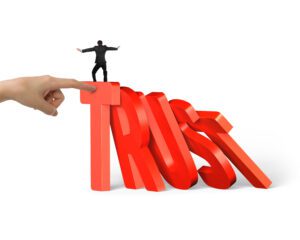
Earlier this month, my colleague, Rob Reaugh, wrote a newsletter post about how one difficult team member can undermine an entire project. That got me thinking about another dynamic I’ve often seen that can be harder to detect but also erodes team performance: lack of trust.
Imagine you’re at the starting point of a spectacular setup: a meticulously arranged sequence of dominos stretches out before you, curving and twisting in intricate patterns. Each domino is standing tall, ready to perform its part. The moment you nudge that first domino, a thrilling chain reaction begins—one tile tipping into the next with a satisfying click, setting off a cascade of movement and sound that ripples through the entire display.
In the world of construction, this domino effect is an apt metaphor for how trust and coordination influence every phase of a project. Picture this: one team misses a crucial deadline. This delay sends ripples through the schedule, causing other teams to scramble and adjust, like dominos falling out of sync. Suddenly, the once seamless flow is disrupted, leading to cost overruns, extended timelines, and frayed nerves.
When trust is intact, it’s like watching those dominos fall perfectly in line, one after another, each smoothly and confidently toppling the next. Teams communicate openly, information flows efficiently, issues are quickly resolved, deadlines are met, and the project moves forward with precision and grace. Everyone knows their role and trusts their counterparts to perform theirs, creating a harmonious and efficient construction process. If things do get off-track, the team quickly pulls together in solidarity to address the issue.

Here are two powerful tips to help your teams develop that kind of trust:
Encourage Open Communication and Transparency
Transparent communication surfaces issues so they can get resolved rather than ignored. It builds trust as team members see that everyone is working towards the same goal. But it’s challenging and can sometimes even feel counterintuitive on construction projects. More than just good intentions is required.
Create processes that encourage regular, open communication among team members. Make sure everyone feels comfortable and safe sharing updates, concerns, and feedback. Hold regular meetings where everyone can discuss progress and any challenges they’re facing. Frequently remind them that they are one team striving together toward the same objectives.
Foster the Human Side of Relationships
Researchers at the University of Pennsylvania conducted a study that showed how positive emotions like happiness and gratitude increase trust between people. Conversely, negative emotions like anger decrease trust. This may sound like a no-brainer, but the important takeaway is that creating opportunities for team members to build positive relationships will also build trust.
Regularly schedule team-building and social activities to strengthen bonds and improve mutual understanding. When team members know each other well and have positive interactions, trust naturally follows. They can more easily weather together the inevitable project stresses and collaborate on solutions. Encourage a culture where teamwork is valued, and everyone is motivated to support one another.
By focusing on these tips, construction project teams can build a strong foundation of trust, ensuring that each phase of the project runs smoothly and efficiently, like a domino chain. This trust will not only enhance team dynamics but also directly contribute to the overall success of the project.
~ Kate

Kate Stewart’s distinguished career spans 25 years as a professional neutral and organizational development consultant for numerous large organizations. Her expertise includes Partnering facilitation on high-profile projects, such as the Kansas City International Airport mega program. She has served as a coach, trainer, researcher, and thought leader across various industries and disciplines on both domestic and international fronts. Kate is based in the picturesque Paradise Valley, Montana, where she enjoys hiking, gardening, and reading.
For more information, please contact Kate Stewart, katestewart@orgmet.com / (406) 414-9922 (cell) or OrgMetrics RobReaugh@Orgmet.com / (925)449-8300

